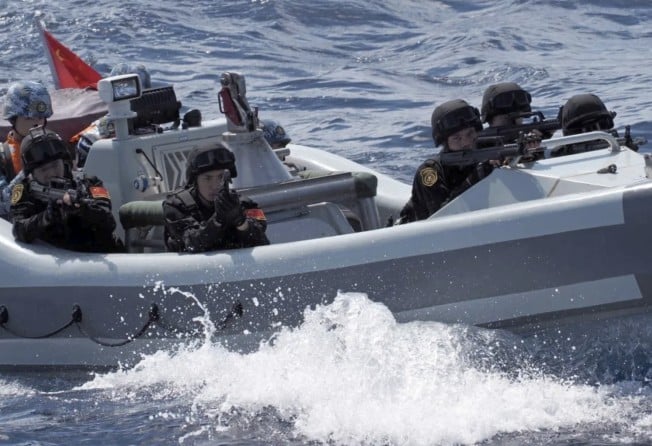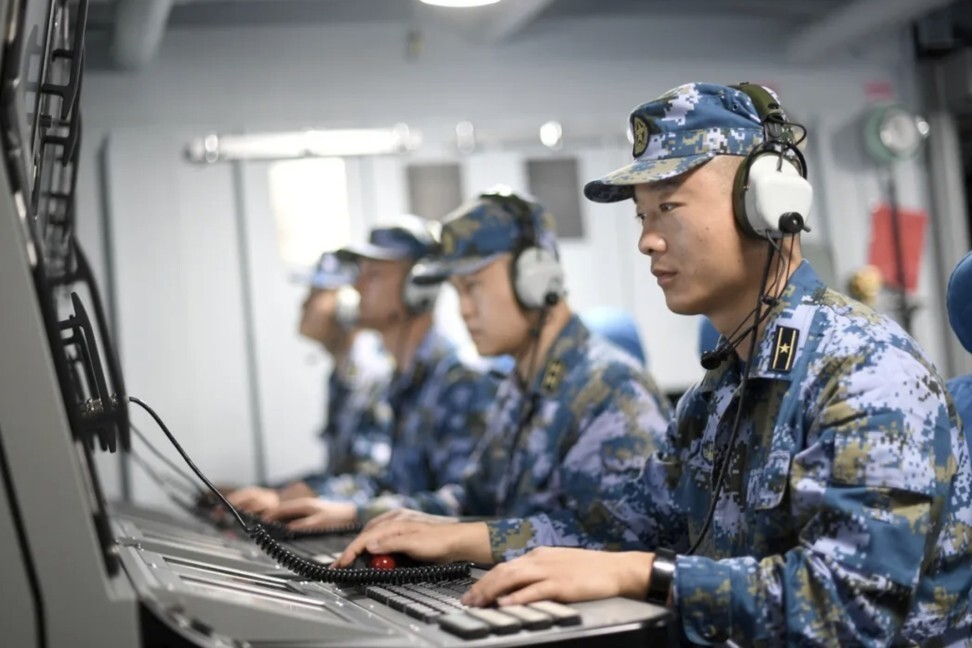Chinese navy anti-piracy drill ends with detour through South China Sea islands for US attention
- Manoeuvre comes days after US Navy challenged Beijing’s claim to Spratlys
- PLA says it remains committed to its mission despite the Covid-19 pandemic

A Chinese navy fleet conducted an escort mission drill through the disputed Spratly Islands chain in the South China Sea after completing an anti-piracy operation in the Gulf of Aden, off Somalia.
Analysts said the mission on Saturday by the 35th escort fleet of the Chinese navy was to boost far-sea training for combat ships and boost protection against piracy for Chinese merchant ships.
The official People’s Liberation Army outlet PLA Daily reported that the fleet, including the destroyer Taiyuan and frigate Jingzhou, conducted drills to rescue hijacked ships and coordinated anti-piracy operations in the Spratlys – called the Nansha Islands by China – passing through the Miyako Strait and Bashi Channel.
PLA Navy officer Yang Aibin was quoted as saying that the Chinese fleet focused on combat exercises to improve their ability to respond to sea and air conditions.
“At the same time, in response to the new situation created by the global epidemic [of Covid-19] and pirates in the nearby area, we are constantly improving our plan and carrying out specialised refining to further enhance the fleet’s ability to perform escort tasks,” he said.
The drill came as the United States stepped up its freedom of navigation operations in the disputed waters, challenging Beijing’s maritime claims.
Last week, guided-missile cruiser USS Bunker Hill “asserted navigational rights and freedoms in the Spratly Islands, consistent with international law”.
US guided-missile destroyer USS Barry also conducted a freedom of navigation mission near the Paracel Islands. China calls them the Xisha Islands, and Vietnam, which also lays claim, calls them the Hoang Sa Islands.
China said it had deployed its navy to warn away the USS Barry.

The US has long accused China of building up military facilities in the South China Sea, deploying anti-ship cruise missiles and long-range surface-to-air missiles.
The 35th escort fleet went to the South China Sea after an anti-piracy operation in the Gulf of Aden in late April, a peacekeeping mission under the United Nations.
The fleet comprises 690 officers and two helicopters in addition to the Taiyuan and Jingzhou. The Chinese military said it was still committed to its mission despite the Covid-19 pandemic.
Collin Koh, a research fellow at the S. Rajaratnam School of International Studies, based at Nanyang Technological University in Singapore, said the drill in the Spratlys and mention of the Covid-19 pandemic seemed to relate to US operations in the South China Sea.
“It’s the first time the destroyer Taiyuan and frigate Jingzhou have embarked on this mission. It’s therefore always opportune for first-timers like these two combat ships to gain more exposure to far-seas training en route to an operational deployment in the Gulf,” Koh said.
“The only different context this time is the recent South China Sea developments, therefore giving the drill in the Spratlys new meaning. Beijing is obviously intent on flexing its muscle on the occasion of this task force deployment to assert its claims against what it sees as US meddling in the area.”
Song Zhongping, a Hong Kong-based military affairs commentator, said pirates might see the Covid-19 pandemic as an opportunity to attack ships, and strong escort support capability was needed.
Piracy was not the only threat. Song said China faced the risk of state-sponsored attacks against its ships, referring to a call by a retired US military officer for the use of privateers to fight Chinese aggression at sea.
“The escort fleet of the Chinese navy may also need to respond to the state-sponsored threat facing Chinese ships. This means there needs to be stricter training demands on our naval fleet,” he said.
Additional reporting by Kinling Lo and Kristin Huang